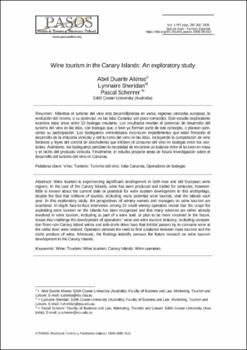Wine tourism in the Canary Islands: An exploratory study
Fecha
2008Resumen
Mientras el turismo del vino está desarrollándose en varias regiones vinícolas europeas, la
evolución del mismo, o su potencial, en las Islas Canarias son poco conocidos. Este estudio exploratorio
examina estas áreas entre 23 bodegas insulares. Los resultados revelan el potencial de desarrollo del
turismo del vino en las islas, con bodegas que, o bien ya forman parte de este concepto, o planean acrecentar
su participación. Los bodegueros entrevistados reconocen impedimentos que están frenando el
desarrollo de la industria vinícola y del turismo del vino en las islas, incluyendo la competición de vino
foráneos y leyes del control de alcoholemia que inhiben el consumo del vino en bodegas entre los visitantes.
Asimismo, los bodegueros perciben la necesidad de encontrar un balance entre el turismo en masa
y el nicho del producto vinícola. Finalmente, el estudio propone áreas de futura investigación sobre el
desarrollo del turismo del vino en Canarias. Wine tourism is experiencing significant development in both new and old European wine
regions. In the case of the Canary Islands, wine has been produced and traded for centuries; however,
little is known about the current state or potential for wine tourism development in this archipelago,
despite the fact that millions of tourists, including many potential wine tourists, visit the islands each
year. In this exploratory study, the perspectives of winery owners and managers on wine tourism are
examined. In-depth face-to-face interviews among 23 small winery operators reveal that the scope for
exploiting wine tourism on the islands has been recognized and that many wineries are either already
involved in wine tourism, including as part of a wine trail, or plan to be more involved in the future.
Issues that challenge the development of operations’ wine and wine tourism industry, including competition
from non-Canary Island wines and anti-drink-drive laws that inhibit passers by to consume wine at
the cellar door were noticed. Operators stressed the need to find a balance between mass tourism and the
niche produce of wine. Moreover, the findings identify avenues for future research on wine tourism
development in the Canary Islands.





